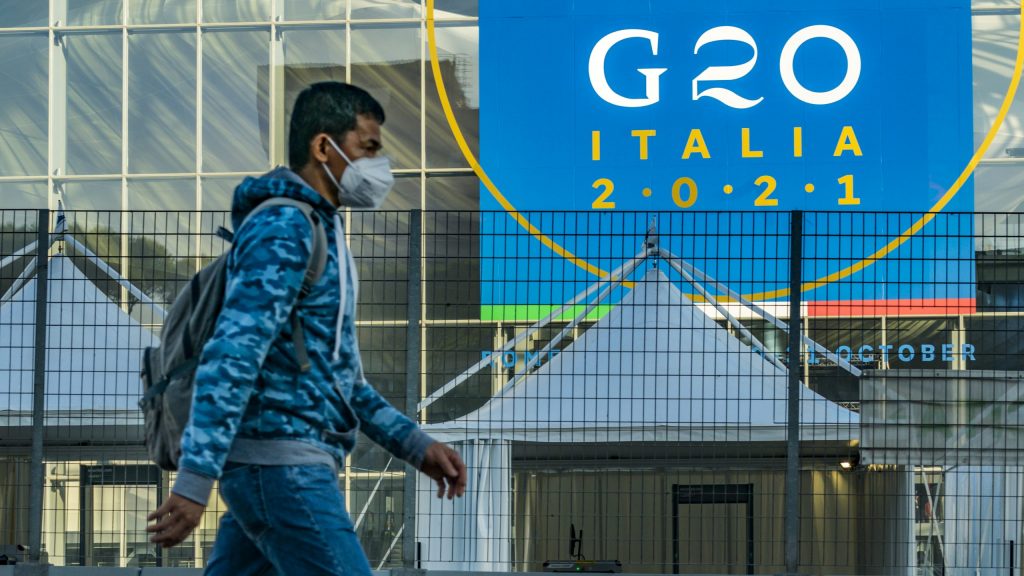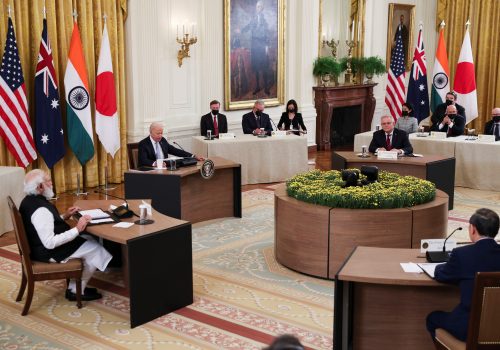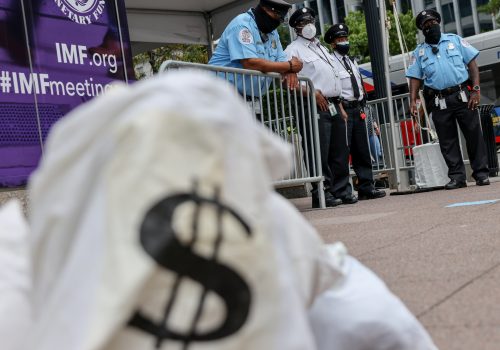Leaders are flocking to Rome this weekend for the annual Group of Twenty (G20) nations summit, which will gather the world’s top economies at a pivotal moment in the global recovery from COVID-19.
With many of the leaders hopping to the United Nations climate change summit shortly after this gathering, climate will likely be a hot topic—but the leaders will also discuss the global supply chain crisis, a deal for a global minimum tax on corporations, debt relief for poor nations, and much more. We asked our experts for a guide to the most pressing issues and what to expect from the summit.
Meet our experts
- Josh Lipsky, director of the Atlantic Council’s GeoEconomics Center and former International Monetary Fund (IMF) official
- Jeremy Mark, nonresident fellow at the GeoEconomics Center and former IMF official
- Nitya Biyani, contributor at the GeoEconomics Center
SUPPLY CHAINS
Josh says: It looks the leaders will convene a special meeting on supply chains—a last minute addition to the agenda. If you’d said that two years ago, people might’ve thought: “Boring.” But now they’re thinking: “Will I get my Christmas gifts in time?” How much can be accomplished? Arguably a lot: On the immediate issue of easing port congestion, there are some changes to global shipping patterns that could speed things up, as well as better information-sharing between nations. And on the longer-term goal of creating a more resilient trading system, the need for reform is staring the leaders in the face. Expect this to be one of the most newsy and consequential outcomes of the summit.
Jeremy says: Normally, the G20 agenda is set throughout a year-long process led by the host government through a succession of working groups and ministerial meetings. So last-minute additions to the proceedings—such as this one—tend to be long on rhetoric and short on concrete proposals. There have been exceptions: For example, the 2009 London summit offered hastily assembled but concrete assistance to low-income countries hit hard by the global financial crisis. But the root causes of the supply chain problems—global shortages of shipping containers and the ships to carry them, a lack of warehouse space and truck drivers in the United States, and energy shortages in China that are hurting factory output—won’t easily respond to G20 declarations. That’s going to require months of hard work on the ground.
GLOBAL TAX
Josh says: This is the big win the Biden administration is touting as it goes into the summit. And for good reason: It’s hard to get 136 nations to agree on seating arrangements, let alone corporate taxes. It’s the most significant and sweeping change to the international tax system in decades, and it gives Team Biden leverage in the current negotiations on its Build Back Better plan because it can genuinely claim that there will no longer be a race to the bottom from competitors. But the stalemate in Congress won’t go unnoticed by other leaders. The tax deal will be featured prominently in communiqués, but it’s not truly done until Congress—and many other legislatures around the world—say it’s done. That’s why today’s potential breakthrough on infrastructure and social spending could give Biden wind at his back as he lands in Europe.
DIGITAL CURRENCIES
Nitya says: Eighteen of the twenty members are exploring central bank digital currencies (CBDCs), while seven of them are engaged in various cross-border pilot programs. The United States is lagging behind most other countries in its development of a CBDC. The absence of standard-setting and an international agreement on principles risks limiting the benefits of CBDCs—which in turn could result in a fragmented system. The creation of a working group within the Digital Economy Task Force, or an expansion of the scope of the International Financial Architecture to include CBDCs, would provide the right forum to begin international collaboration on the issue.
Josh says: This is the sleeper issue of the summit. The Group of Seven (G7) finance officials surprised many observers this month with a statement of principles on digital currency. They called for more international coordination (and on paper, at least, Russia and China agree). Russia and China, like the United States, are also worried about the rise of cryptocurrencies and how it might impact their own monetary sovereignty. But China is far ahead in the race for its own central bank digital currency. If the United States tries to get the rest of the world to agree to some standards that balance privacy and security, expect China to leave its name off the signatory line.
DEBT RELIEF
Jeremy says: The G20 has already spoken on debt relief. The finance ministers’ meeting during the IMF and World Bank annual meetings earlier this month made it clear that the group is firmly committed to more of the same. That’s to say: The Debt Service Suspensions Initiative, which has provided about $5 billion of debt-service relief during the pandemic, will be allowed to lapse at the end of this year. Meanwhile, the G20 reaffirmed its commitment to the Common Framework for debt treatment, a blueprint for debt restructuring that, so far, has not resulted in a single penny of relief for the world’s most indebted low-income countries.
The G20 has avoided action on a key stumbling block to debt restructuring: the unwillingness of private creditors to participate constructively in the process. That said, US National Security Advisor Jake Sullivan declared in a pre-summit briefing that the United States “is looking forward to a strong and ambitious statement” on plans to make use of a one-time issue of $650 billion of IMF Special Drawing Rights. A major portion of that sum was apportioned to G20 countries, and the governments are still trying to work out how their shares might best be shared with the poorest countries.
Further reading
Thu, Sep 30, 2021
Why the Quad summit was a strategic success
New Atlanticist By Ash Jain
While its specific outcomes may have been relatively modest, the summit successfully laid the foundation to advance three strategic US goals: countering China, aligning India, and revitalizing alliances.
Wed, Oct 13, 2021
The IMF needs to prepare for the post-COVID world
New Atlanticist By
The institution has shifted its focus toward climate policy and development finance in the last two years, but it should not stray from its global stability mandate.
Wed, Oct 20, 2021
Let them eat communiqués: Rich countries’ pandemic inaction
New Atlanticist By
Struggling countries came away with more questions than answers from last week's IMF and World Bank meetings.
Image: A man walks by a banner announcing the G20 summit in the glass wall of the Nuvola Congress Center in Rome. Photo by Celestino Arce/NurPhoto/REUTERS



